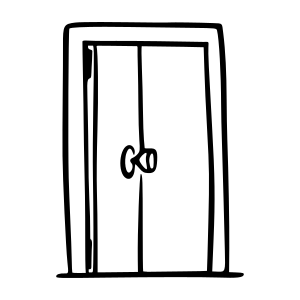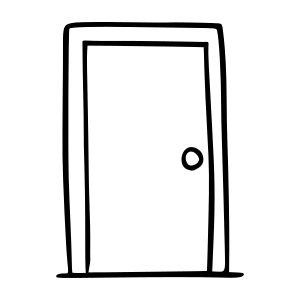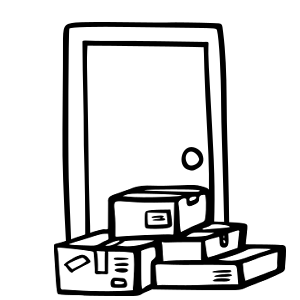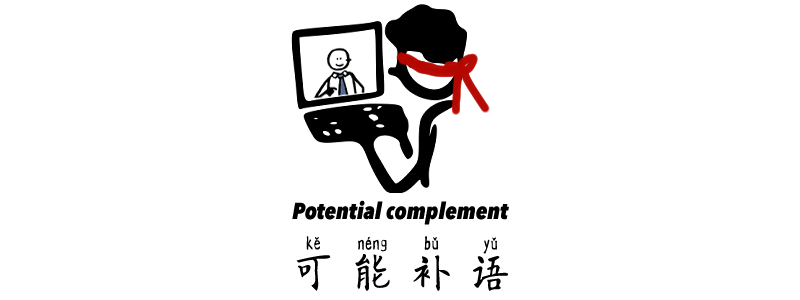Grammar Point:
Potential Complements indicate whether or not an action is possible, which means whether it is able to be done or not. It’s not that complicated, is it? The structure is also simple – just add 得 de or 不 bu between the result complement and the verb.
Result complement VS Potential complement:
The Result complement indicates the result or outcome of an action. It usually appears after the verb and provides information about the degree, extent, or condition of the action. The Potential complement, on the other hand, indicates whether an action is possible or not. It provides information about the ability or capacity to perform an action. Let me give you an example:
Result Complement (Fact)

Postive
門打開了门打开了
The door is open.
In this sentence, “打开了 dǎ kāi le” is a Result complement indicating the result or outcome of the action. It confirms the fact that the door is open.

Negative
門沒打開门没打开
The door is not open.
In this sentence, “沒打开 méi dǎ kāi” is a Result complement indicating the negative result or outcome of the action. It confirms the fact that the door is not open.
Potential Complement (Possibility)

Postive
門打得開门打得开
The door can be opened.
In the sentence, ‘打得开 dǎ de kāi’ is a Potential complement indicating the ability or possibility to perform the action of opening the door, regardless of whether the door is actually open or not.

Negative
門打不開门打不开
The door cannot be opened.
In this sentence, “打不开 dǎ bu kāi” is a Potential complement indicating the inability or incapacity to perform the action, regardless of the actual status of the door, the person is unable to open it.
The structure just like this:
| Verb (action) | 得 or 不 | Result complement | = | Explanation |
|---|---|---|---|---|
| 听 tīng (listen) | 得 | 清楚 qīngchu (clear) | = | 听得清楚 tīng de qīngchu (can listen clearly) |
| 洗 xǐ (wash) | 不 | 干净 gānjìng (clean) | = | 洗不干净 xǐ bù gānjìng (cannot wash something cleaning) |
| 吃 chī (eat) | 不 | 完 wán (finish) | = | 吃不完 chī bù wán (cannot finish eating the food) |
Structure
Able to: V + 得 + RC
Objects in sentences with potential complements can occur either after the complement or at the beginning of the sentence.

A:你看得到我嗎?你看得到我吗?
Can you see me?
B:我看得到我看得到
I can see you.
台灣人說的話你聽得懂嗎?台湾人说的话你听得懂吗?
Do you understand what the Taiwanese say?
別擔心,這衣服洗得乾淨别担心,这衣服洗得干净
Don’t worry, the clothes can be cleaned.
你點這麼多菜,吃得完嗎?你点这么多菜,吃得完吗?
You order so many dishes. Can you finish them all?
你點這麼少菜,吃得飽嗎?你点这么少菜,吃得饱吗?
Will you be full after ordering so few dishes?
Not able to: V + 不 + RC

A:你看得到我嗎?你看得到我吗?
Can you see me?
B:我看不到我看不到
I can’t see you.
我病了,明天上不了課我病了,明天上不了课
I’m sick. I can’t go to class tomorrow.
太吵了!我聽不清楚太吵了!我听不清楚
It’s too loud! I can’t hear clearly.
功課太多,我真的做不完功课太多,我真的做不完
I have too much homework, I really can’t finish it.
我抓不到冰箱上面的貓我抓不到冰箱上面的猫
I can’t reach the cat on top of the fridge.
Can I just use 能 néng or 可以 kěyǐ instead of the Potential complement?
The answer is yes and no. If you say this, we can understand you. However, the Chinese words 能 néng and 可以 kěyǐ have multiple functions. Using the potential complement can help avoid the possibility of misunderstanding. For example, “我不能看到 Wǒ bù néng kàn dào” can be interpreted as either picture A or picture B.




